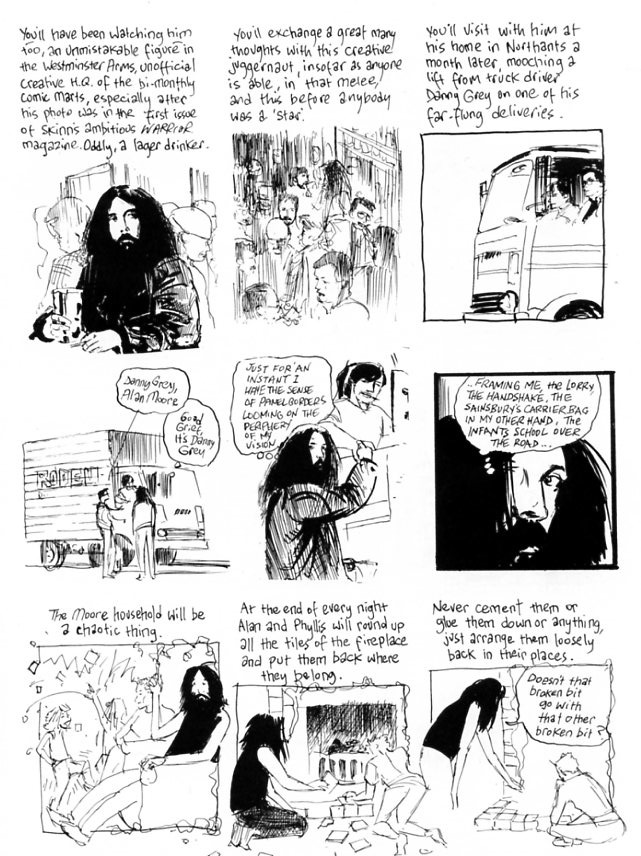Greetings, Hooded Utilitarians. My name is Casey Rae-Hunter, and I’m a so-and-so who lives in Washington, DC. Both personally and professionally, my karma sees to it that I wrangle with issues at the intersection of creativity, policy and technology. I also wear pants, which have been known to have years, and vice versa.
It is my sincere hope that my twaddle in no way corrupts my fellow roundtablers’ insights and illuminations. And if it does, I can only offer a heartfelt GAROOGA!
For those playing along at home, the above exclamation is borrowed from Eddie Campbell’s seminal comic Alec, which we are here to discuss. More specifically, the massive doorstop that is Alec: The Years Have Pants — a compendium of Campbell’s autobiographical and graphomaniacal works from sometime in the late 1970s through, well, nearly eternity.
Campbell’s alter-ego Alec McGarry is a shiftless gadabout artist who (sometimes) works a dead-end, menial job, and more often drinks lager and ponders life’s deeper questions. If that sounds interminable, it is not. There is poetry here, and plenty of it. Current and former inhabitants of bohemia will recognize the yearning — creative and romantic — experienced by Alec and his fellow travelers.
“Loneliness, he remembered reading, is not so much a longing for company as a longing for kind,” Alec interjects in one of Campbell’s chaotic yet precise pen-and-ink panels. It’s as good a summary as any for this body of work, which marries the profound with the mundane in a fluid conversation without any real beginning or end.
Alec McGarry is a man of revelation, sometimes abstruse, often evocative. “I am the only element of continuity in my own life,” he remarks somewhere in between his fall out with slacker mentor Danny Grey and several messy yet majestic romantic encounters. Because Alec is, by definition, a romantic — a philosopher prince who flits through a kingdom populated by those who feel first, accomplish second.
Not that there aren’t accomplishments. Campbell’s own career arc is reflected in Alec’s scrappy rise from flat scribbler to bona fide publisher. Along the way, he meets and collaborates with comics legend Alan Moore (whose wizardly visage Campbell captures perfectly), woos and marries Anne and decamps to his bride’s native Australia. How’s that for slacking?
The kickoff of this here roundtable mentioned one of my favorite Alec chapters, “How to Be an Artist.” Noah didn’t much care for it, but to me it’s where the book finds its footing after so much pubbing, brawling and fucking (and there’s not actually that much fucking). I wasn’t in Great Britain at the dawn of the self-published comics revolution, but its heroes and villains are known quantities. I found it amusing that mystic marauder Bryan Talbot swiped a gig promised to Alec/Campbell by Alan Moore. (In fact, I almost took a break to re-read Luther Arkwright, but reminded myself of my Utilitarian duties.) Equally interesting is Alec’s barely-concealed jealousy of Art Spiegelman. At least I think it was jealousy. The English emotional spectrum can be difficult to parse, especially in crosshatched panels.
Alec is a self-indulgent work, which, as an autobiographical effort, it has some right to be. Many of the book’s characters tell its protagonist that he is impossibly selfish, an accusation Alec McGarry does little to defend himself against. But there is poetry here, as I mentioned before. And lots of it.
So it is the poetry I prefer to focus on. I may not have as much of it in my soul as I once did, which is why I find this work compellingly troublesome. Alec taunts me for my reticence to engage, to fully feel the zephyrs of experience, to accept persons and places as they are, without becoming attached to ideas of how I want them to be. When you grow out of this approach to living, it can be galling to be confronted with evidence that some have not.
Which leads me to a question: where did you misplace your ardor? That is, if you’ve misplaced it. And if you haven’t, might you have some extra to spare?
____________
Update: The entire roundtable on the Years Have Pants is here.


“The English emotional spectrum can be difficult to parse”
MacGarry is Glaswegian.
Of course he is. But much of the action takes place in Great Britain. And, seeing as though Mr. Campbell has spent the better part of the last several decades in Australia, perhaps I should’ve said “the Aussie emotional spectrum.”
PS: Geddy Lee is still Canadian.